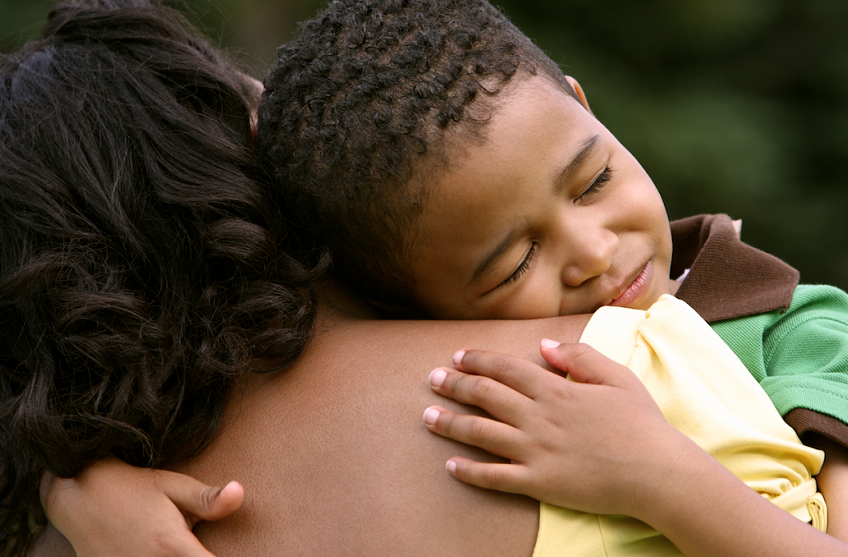When it comes down to it, you’re either a hug person or someone who tolerates them. Hugging is a pretty intimate act — after all, you’re wrapping your arms around another person and allowing them close to your body. They are certainly not everyone’s cup of tea, but according to a new study, hugs do come with some health benefits.
The research, published in the journal PLOS One, found that hugs can lessen the psychological blow of an interpersonal conflict. Given the stress that comes along with a conflict, it can also mean physical or emotional discomfort, so any way to minimize that — like with a hug — can be helpful.
The authors note that the connection between touch and well-being has been known for a while, but previous research focused exclusively on romantic relationships. But this study looked at hugs in general from a wide range of social partners.
The researchers surveyed 404 participants every night for two weeks about their conflicts, hugs they’re received and their good and bad moods. They noticed that people who reporting getting a hug on the day of a conflict had a smaller decrease in positive emotion and a smaller increase in negative emotion than those who weren’t hugged. In other words, hugging helped in growing emotionally.
Basically, more research is needed in this area, but the authors came to the preliminary conclusion that hugs could be a good way of providing support after a conflict.
“This research is in its early stages. We still have questions about when, how, and for whom hugs are most helpful,” Dr. Michael Murphy of Carnegie Mellon University, one of the authors of the study, said in a statement. “However, our study suggests that consensual hugs might be useful for showing support to somebody enduring relationship conflict.”
We hug others when we’re excited, happy, sad, or trying to comfort. Hugging, it seems, is universally comforting. It makes us feel good. And it turns out that hugging is proven to make us healthier and happier. According to scientists, the benefits of hugging go beyond that warm feeling you get when you hold someone in your arms.
When a friend or family member is dealing with something painful or unpleasant in their lives, give them a hug, says health.com. Scientists say that giving another person support through touch can reduce the stress of the person being comforted. It can even reduce the stress of the person doing the comforting. In one study of twenty heterosexual couples, men were given unpleasant electric shocks. During the shocks, each woman held the arm of her partner.
Researchers found that the parts of each woman’s brain associated with stress showed reduced activity while those parts associated with the rewards of maternal behavior showed more activity. When we hug someone to comfort them, these parts of our brain may show a similar spiritual wellness response.
The stress-reducing effects of hugging might also work to keep you healthier, notes usnews.com. In a study of over 400 adults, researchers found that hugging may reduce the chance a person will get sick. The participants with a greater support system were less likely to get sick. And those with the greater support system who did get sick had less severe symptoms than those with little or no support system.
Oxytocin is a chemical in our bodies that scientists sometimes call the “cuddle hormone.” This is because its levels rise when we hug, touch, or sit close to someone else. Oxytocin is associated with happiness and less stress.
Scientists have found that this hormone has a strong effect in women. Oxytocin causes a reduction in blood pressure and of the stress hormone norepinephrine. One study found that the positive benefits of oxytocin were strongest in women who had better relationships and more frequent hugs with their romantic partner. Women also saw positive effects of oxytocin when they held their infants closely.
Most human communication occurs verbally or through facial expressions. But touch is another important way that people can send messages to one another. Scientists have found that a stranger was capable of expressing a wide range of emotions to another person by touching different parts of their body. Some emotions expressed include anger, fear, disgust, love, gratitude, happiness, sadness, and sympathy. Hugging is a very comforting and communicative type of touch.
But before you go off hugging your coworkers or acquaintances or literally anyone else, please remember that this isn’t carte blanche to touch anyone you want. Hugging, like any of type of touching, should be consensual. Also, be mindful that there are plenty of people out there who don’t like to be hugged — not by their partner, not by their parents and definitely not by some stranger they just met at a work event.
So while this particular study found that hugs can be beneficial after conflict, don’t forget that the hug itself could be a negative experience for someone. Like anything else: Ask before you touch.
